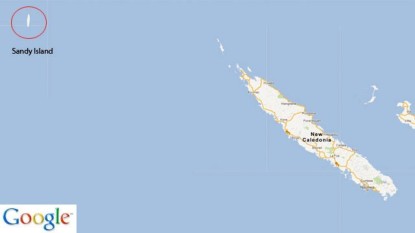 Sandy Island was nowhere to be found when Australian scientists this week reached the South Pacific location, halfway between Australia and French-owned New Caledonia, where it is supposedly situated, and where it appears on Google Earth…
Sandy Island was nowhere to be found when Australian scientists this week reached the South Pacific location, halfway between Australia and French-owned New Caledonia, where it is supposedly situated, and where it appears on Google Earth…
****************************************************
Just as King Kong was the larger cousin of ordinary apes, Moby Dick was the larger cousin of ordinary whales and Godzilla was, well, a creature made up for films, Jonas was the larger cousin of ordinary dolphins. He was a Giant Lesser-Spotted Dolphin, over one hundred years old, half a mile long and five hundred yards wide.
Jonas lived alone. He preferred it that way. His brother had moved to Scotland where he lived in some lake, scaring visitors and helping the finances of a region which otherwise would have had no tourist trade other than those who believe that golf is a sport.
His smaller relatives sickened him, wasting their intelligence on appeasing and entertaining man by jumping through hoops and head-butting beach-balls. Flipper in particular infuriated him, making a sound like a Renault Clio trying to start on a cold morning in order to tell his owner (owner!) that Timmy had fallen down a well, or something like that anyway.
Because Jonas navigated the deep by sonar he could pick up radio stations, and because he had a normal dolphin’s IQ in a brain a thousand times bigger he could understand human speech. He spent his days at the bottom of the ocean, happily investigating shipwrecks and listening to BBC Radio 4.
Occasionally, though, he would have to clear his blow-hole, which would fill with plankton, seaweed and bottles with messages in them. In order to do this he would surface, pinch his snout really hard with his flippers, and blow.
The eighty-foot-high jet of rubbish that would ensue was as famous an unexplained phenomenon in the South Pacific as St Elmo’s Fire. Natives called it the N’ehru’haga, meaning Snot-Fountain.
And on one such Purging Day, while he was on the surface for a mere thirty seconds, he was photographed by Google Earth. The Lesser-Spotted Dolphin was less lesser-spotted.
They decided that he was an island. They called him Sandy Island, a name in which both words were wrong, since he was in no way red-headed.
He learnt that he was in French territorial waters, and his resolve to stay hidden remained stronger than ever. After all, the French ate snails, frogs and horse, he didn’t want to chance it.
Now, he had heard, a group of scientists was coming to confirm the existence of the island. He watched them appear on the horizon, then sank to the ocean depths while they sailed around in circles and increasing bewilderment. Eventually they made ready to leave, and one man at the stern began to pull in their equipment.
Jonas couldn’t resist it. He swam softly upwards, then popped his face, the size of a cliff, above the surface, and spoke.
“You’re going to need a bigger boat,” he said.
Quite entertaining! My favourite is “less lesser-spotted”
LOL Tinman this has some really funny lines.
Your explanations always make much more sense 🙂
I’m still giggling at ‘Snot-Fountain.’